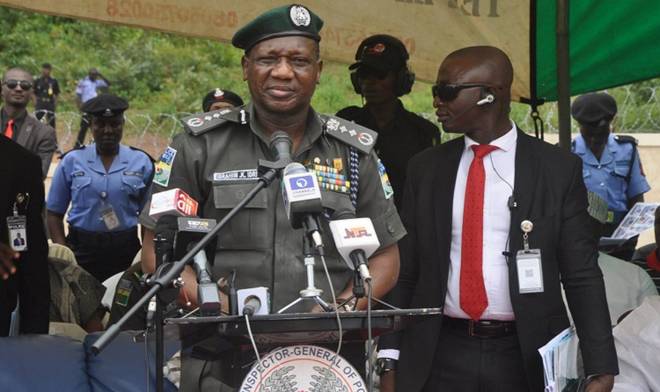
When I first heard that Inspector General of Police Ibrahim Idris responded promptly to Acting President Yemi Osinbajo’s order to reorganize the Special Anti-Robbery Squad [SARS] by changing its name to Federal Special Anti-Robbery Squad [FSARS], I thought of a story that the great Kenyan writer Ngugi wa Thiong’o told in his book Detained. Out of fervent African patriotism, Ngugi, who was a lecturer in the University of Nairobi’s Department of Literature, changed his name in 1977 from James Ngugi to Ngugi wa Thiong’o.
Not long afterwards, Kenya’s controversial Attorney General Charles Mugane Njonjo stood up in Parliament to contribute to a debate on the university’s budget. Njonjo suddenly veered off the subject matter and said, “Concerning the Department of English [sic], I would like the Assistant Minister who is present here today to ensure that only people with the right qualification are appointed to teach in it. Some people who are teaching in this faculty [sic] think if you call yourself Kamau wa Njoroge, you are a very important person, or a lecturer with a lot of know how. You no longer call yourself James Kamau. You call yourself Kamau wa Njoroge…”
Concerning the Special Anti-Robbery Squad [SARS], I would like the Inspector General, when his attention is drawn to this column, to ensure that only policemen with the right qualifications are appointed to serve in it. Some policemen who are serving in this command think if its name is changed to Federal Special Anti-Robbery Squad, it is a very important force or a force that has tremendous respect for human rights. It no longer calls itself SARS. It calls itself FSARS…
If name change alone will transform a police agency into a more human rights-friendly one, we should have seen the dividends when the Babangida regime changed the name of National Security Organisation [NSO] to State Security Service [SSS] in 1986. Later, SSS surreptitiously changed its name to Department of State Service, DSS. However, we did not see any change from 1985, when then DIG Muhammadu Gambo opened NSO’s dungeons and we saw how it illegally detained people, and last week when DSS’s acting director general freed a lot of people illegally detained by its former DG.
If name change alone is what transforms an organization, we have in this country many government agencies that changed their names over the years but we did not witness many changes in their ways of doing things. Sometimes they actually went from bad to worse. For example, in 1984, the military government of Major General Muhammadu Buhari took the old, plodding state telephone monopoly P&T [Posts and Telegraph] and merged it with the younger and very profitable NET [Nigeria External Telecommunications] to form Nigeria Telecommunications, NITEL. What happened? Instead of P&T to imbibe the managerial habits of NET, its old habits prevailed and both of them went asunder when the private telecom operators came on the scene three decades later.
Not only telecoms. In 1972, General Yakubu Gowon took the epileptic state power monopoly Electricity Corporation of Nigeria [ECN] and merged it with the Niger Dams Authority [NDA] to form the National Electric Power Authority, NEPA. When electricity supply in Nigeria actually worsened, NEPA’s name was changed to Power Holding Company of Nigeria [PHCN] and when that, too, did not help matters, PHCN was disaggregated into Gencos and Discos. Nigerians are still waiting for improved power supply.
In the 1960s when our roads, bridges and culverts were maintained by the Public Works Department [PWD], we had far fewer potholes but the government changed the agency’s name to Ministry of Works. MOW is doing far less work than PWD did despite having more money, and many old timers are wondering why we changed the name in the first place.
Up until 1975, the head of the Army in this country was called Chief of Staff, Army. Soon after General Murtala Mohammed seized power that year, Supreme Headquarters announced that Lt General T.Y. Danjuma’s designation had changed to Chief of Army Staff. The same change applied to the heads of the Navy and Airforce. To date I do not know the difference between Chief of Staff, Army and Chief of Army Staff but the change did nothing to alleviate the aggressive character of our soldiers.
Not only soldiers. Throughout the 1970s, the centre of federal administration in Lagos was called Cabinet Office. As soon as President Shehu Shagari was inaugurated in 1979, it was announced that Cabinet Office’s name had changed to Executive Office of the President. When General Babangida came along in 1985 he again changed the name to Presidency. Nigerians have however not seen any reduction in the office’s bureaucratic red tape.
The top official in this office also underwent a serial name change. In the old Regions, the top officer in the Premier’s Office was called Secretary to the Premier, or Sec Prem. After 1967, military rulers renamed the officer Secretary to the Military Government and Head of Service, SMG. At the federal level, the officer was called Secretary to the Federal Military Government and Head of the Federal Civil Service. When civilian rule returned in 1979, the officer was renamed Secretary to the Federal Government [SFG] while the state ones were called Secretary to the State Government, SSG. The former was later renamed Secretary to the Government of the Federation, SGF. Despite the name changes, service values continued to plummet under this office until we arrived at the current situation.
In sports too, we had name changes that did not translate into superlative performance. Up until the 1970s the national football team was known as the Green Eagles. When they won the African Cup of Nations in 1980, government renamed them Super Eagles. Instead of going on to win the World Cup with the new name, Super Eagles recently had a hard time in Russia and were ousted at the Group Stage. Government has however not learnt any lesson because we recently heard that Nigeria Airways, which collapsed under the weight of its Flying Elephant logo, is coming back and has been renamed Nigeria Air.
In Nigeria here, even private sector agencies that borrowed a leaf from government and serially changed their names hardly did better. The first-generation banks all underwent name changes, from Barclays Bank to Union Bank, from Standard Bank to First Bank and from IBWA to Afribank to Mainstreet Bank. They however watched askance as newer, smaller, more fleet-footed banks swept the financial scene with technological and product innovation. The banks’ main product, money, also underwent a name change that turned out to be for the worse. In January 1973 the Central Bank of Nigeria withdrew pounds, shillings and pence as legal tender and renamed them Naira and Kobo. Since then our currency’s exchange rate has dipped from 20 kobo to 360 naira to the US dollar.
Oil marketing companies did not fare any better with name changes. Once upon a time, all the petrol stations in this country were named Shell, Mobil, Agip, Total and Texaco but the Obasanjo military regime nationalized all of them in 1977 [because they failed to observe sanctions against apartheid South Africa] and renamed them National Oil and African Petroleum. Since then we have had more fuel shortages and more upward price adjustments than we can count.
Look, many African countries changed their names in the last 50 years, from Bechuanaland to Botswana, Basutoland to Lesotho, Malagasy to Madagascar, Tangayinka and Zanzibar to Tanzania, Nyasaland to Malawi, Rhodesia to Zambia and Zimbabwe, Upper Volta to Burkina Faso, Gold Coast to Ghana, Dahomey to Benin Republic, Ivory Coast to Cote D’Ivoire and South West Africa to Namibia. Did it lead to eradication of poverty? Even Organisation of African Unity [OAU] that changed its name to African Union [AU], did it make Africa more united?




